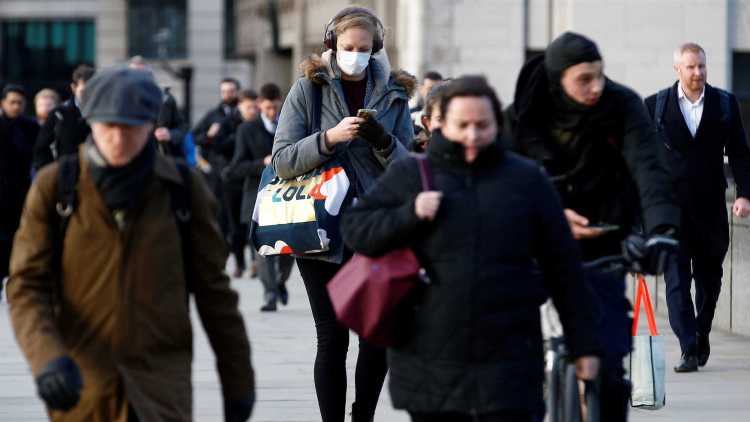In Brief | 13/03/2020
The Coronavirus and Germany
Article by Amrita Narlikar, 13 March 2020 – There’s “Keep-calm-and-carry-on” and then there’s burying one’s head in the sand.

Germany’s blasé response to the Coronavirus crisis reveals some unpleasant truths. If we have any hope of flattening the curve, the narrative needs changing.
How people react to crises can tell us a lot about them.
Speaking on a national TV channel in the UK this weekend, Dr Richard Hatchett from the Coalition for Epidemic Preparedness Innovations pointed to the dangerous combination of infectiousness and lethality that characterizes COVID-19. He compared the virus – yes, to SARS and Ebola - and still said “This is the most frightening disease I’ve ever encountered in my career.” (https://twitter.com/Channel4News/status/1235994748005085186). The exponential growth rates in cases, and high fatality rates, across the world certainly give cause for great worry. And since the concern in the UK is clearly legitimate, we in Germany should be even more concerned: the number of cases here is over three times higher than the UK, and the fourth highest in Europe (https://www.ecdc.europa.eu/en/geographical-distribution-2019-ncov-cases). Walking around in sunny Hamburg though, you would not believe that the situation is so serious.
Business-as-usual seems to be the motto in social life. People continue excitedly with their holiday plans, go gallivanting off even to high-risk zones, resist advice of employers on avoiding unnecessary travel, warmly invite visitors also from high-risk areas, delight in participating in meetings even when decent digital options are available, and disregard even basic WHO guidelines of maintaining “social distance”. At least in daily life, there are few obvious signs that people are trying to contain the outbreak. At best, one gets a shrug of the shoulders, a sad smile, a tear for Italy, and then we all agree to meet for dinner in a crowded restaurant.
For some in Germany, this is a “keep calm and carry on” attitude, as befits an open society. As a libertarian, I love open societies, detest “nanny-states,” and also do not really have a problem with people choosing to endanger their own lives (if that is what they wish to do). But taking such a blasé attitude reeks, to me, of a Nero-esque decadence. I have five take-aways from what I’ve seen in the German reaction thus far.
First, I am surprised by the indifference with which people are handling the public health consequences of their actions as individuals. And this is all the more surprising in Germany, where people seem to pride themselves for their integrated societies and social capitalism (in contrast to the relative individualism and limited social welfare that we see in the US and the UK).
Second, we know that the disease is highly infectious across diverse age-groups, but its effects are especially dangerous for groups who already have certain health conditions and the elderly. People with mild symptoms can be carriers, even before the disease expresses itself in them during its incubation period. If we refuse to self-isolate, refuse to take up digital options, refuse to curtail our (unnecessary) travels, continue with our social and professional lives as usual – and contribute to the spread of this fatal disease – it will be the most vulnerable who will be the hardest hit. This strikes me as rather selfish and irresponsible.
Third, the most often that I hear about the possibility of having home office – even when we have a pandemic within our own borders – is if parents are affected by the lack of childcare facilities due to Coronavirus. This leads me to wonder if the reaction to the virus would have been different had the high fatality rate affected younger age groups. Were its children being affected by the disease on a similar scale as its sick and old members are being affected, German society would have reacted much more strongly with travel bans, closures of offices and schools, strict limits on person-to-person meetings etc. And while the protection of children and minors must be – without question – a societal priority, to assume that this is the only vulnerable group is a perversion of a powerlessness narrative (on such paradoxes and power reversals, see Narlikar, forthcoming, https://www.cambridge.org/core/books/poverty-narratives-and-power-paradoxes-in-international-trade-negotiations-and-beyond/E590E360D5F0409A2E9F184664071D39). Any society – that can in fact claim to be remotely social – must protect its diverse vulnerable groups – the young, the sick, the old, and others.
Fourth, as a colleague in Berlin recently pointed out to me, the denial of low-risk groups to take this crisis seriously may turn out to be rather short-sighted. We have no idea on how the Coronavirus affects us in the medium-to-long run, and besides, viruses do have a nasty habit of mutating. Just because the young and the healthy among us feel invincible today does not mean that we will be safe from the disease tomorrow. And in any case, if each one of us does our bit to #FlattenTheCurve now (e.g. with social-distancing), we could help reduce the flow of the infection and potentially limit the extreme pressures that the public health system will be under. Protecting ourselves, and saving the lives of others, go hand in hand.
Finally, my fifth take-away is the lack of take-aways from this experience by German politicians. Germany’s love affair with China goes largely unabated – that pesky issue of 5G notwithstanding. There is far too little discussion on the impact that Chinese authoritarianism had in terms of suppressing medical personnel who tried to alert the community to the scale of the crisis. And even sadder is the almost complete disregard on how this disease seems to have first gotten transmitted – in the appalling conditions of China’s live animal markets. There is only so much torture and mistreatment that nature will endure – at some point, she will fight back. Liberalism needs to grow a spine and protect the values that it claims to stand for. And these values, I hope, one day before long, will explicitly include the protection of not only vulnerable people, but also endangered species and biodiversity (and indeed better conditions for farmed animals also within western societies). This in turn will probably need to translate into more decoupling from China, not only for geoeconomic reasons but also for reasons of values, beliefs, and norms.
So what would a good reaction to the Corona outbreak look like? Institutions can go a long way in creating the necessary policy context: one in which physical meetings are cancelled, schools and universities are closed, travel restrictions are put in place, communication technologies are made available for meetings and online learning, home office strongly encouraged etc. Of course these measures are costly, and will need strong state support; to delay implementing such measures however is to be penny-wise and pound-foolish in terms of both human and material costs. And ultimately, the most important influence will be a change in the narrative. Such a narrative would recognise that healthy individuals in low-risk categories should do whatever they can to avoid becoming carriers, even if this might mean curtailing some of the indulgences that we have become used to. And we should do this not from a moral high-horse of altruism, but because it is as much in our own interest to protect those in need of it as it is in theirs.
This article was first published at Global Policy.
Some of the ideas presented in this article also appear in the author’s exchange with Carsten Germis in FAZ.NET.
